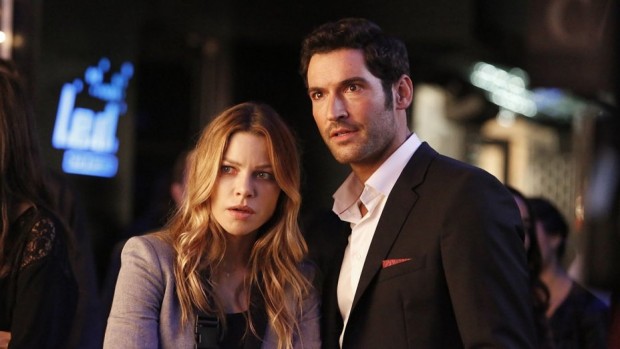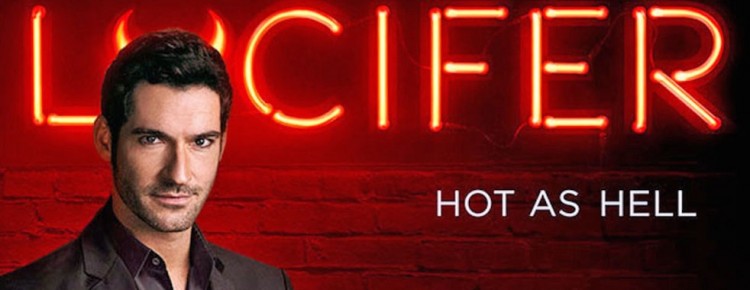The 2015-16 television season is ending, and while I look forward to the slightly more relaxed summer schedule (not that it saves me any time), I’m very sad about being without some of my favorite shows for three to five months. It certainly seems early for some of these shows too. Clearly May Sweeps are no longer important (if they exist at all) if all the great shows are ending in April.
One of those shows is the new Fox hit Lucifer, which only barely got started. It premiered in late January and aired its awesome season finale last night. I was curious about it from the start, but for some reason I didn’t start watching until about a month ago. I was instantly hooked, and my husband Alex and I crammed through the fourteen episodes quickly.
Tom Ellis plays Lucifer Morningstar, a nightclub owner in Los Angeles—and the Devil. Yes, THAT Lucifer. Tired of being in charge of Hell, he wanted to exercise his free will, so he left and moved instead to, where else, Los Angeles. His demon/guardian Maze (Lesley-Ann Brandt) works at the club with him, and his angel brother Amenadiel (DB Woodside, finally back on my screen since Buffy the Vampire Slayer), who desperately needs a nickname, keeps trying to get Lucifer to return to his post. When a friend is murdered, Lucifer gets involved with Detective Chloe Decker (Lauren German) of the LAPD and helps her solve crimes, punishing evildoers in a new way, while constantly trying to sleep with her (she is oddly resistant to his charms, which make most women and some men want to sleep with him). They build an honest friendship over the course of the season, but that delicious will-they-won’t-they of course fuels the flame.
He also meets a therapist (the excellent Rachael Harris, finally in a worthwhile role), and she works with him . . . in exchange for sex. She’s clearly not the most ethical of doctors (and it gets worse as the season progresses), but we’ll just let that slide for now. Maybe that’s what Lucifer finds so appealing about her.
Lucifer speaks honestly to everyone about who he is, and never hides his true self (well, except for hiding his true likeness), but naturally people don’t believe him. They play along, assuming he’s speaking in metaphors. Because our language is so rife with these metaphors already (I use at least two examples in this blog post), it’s easily done. It’s also highly entertaining.

That’s the very simple version of the plot. It’s essentially a police procedural, unfortunately, but there’s plenty of mythology to go along with it. The show is based on the DC comic by Mike Carey, as Alex reminds me whenever we watch it. The comic was a spinoff of Neil Gaiman’s The Sandman, one of Alex’s favorite comics. He’s sometimes disappointed that the show strays from the comic, but I’ve never read it, so it’s hunky-dory by me (emphasis on the hunky).
The Wales-born Ellis is incredibly charming and sexy as Lucifer. That’s definitely what attracted me to the show at the beginning. That, and the show’s devilish sense of humor. But Ellis is more than just a pretty face. He’s an all-around performer, frequently singing and playing piano in the show (sometime I’ll have to write more in depth about the wonderful use of music on the show), and he’s quite a talented actor: there’s a lot of heartbreaking vulnerability in his performance as well. This Devil can get away with a lot (both on the show and in my critical eye) because he’s so charming, and Ellis is perfect for the part. I’m convinced the show would not do nearly as well if a lesser actor were in the role.
The story strays not only from the plot of the comic, but clearly from the heaven and hell mythology. I believe this version is based largely on John Milton’s Paradise Lost, but truthfully, I know nothing about the mythology—any mythology. I was discussing it with a colleague this morning because she blogged about the show (in fact, she inspired me to write this post). She explained that each religion has their own version of the order of the universe and how it works, but I don’t know about any of them. I remain blissfully ignorant of most religions (a possible topic for another day).
In fact, I’m one of the people the show addressed last week in its penultimate episode: I always assumed that because the Devil was the ruler of Hell, that he was inherently evil. That he enjoyed his role as the punisher in a gleeful, sadistic way. Therefore, doing wretched, criminal things would be something he’d enjoy and encourage. This is apparently not true. He was simply punished by his father (God), though for exactly what (in the show) I’m not sure, and placed as ruler of Hell in response. He’s in charge of doling out punishment for those who commit evil, but he doesn’t do it himself. In fact, he’s serving out his own punishment.
That character reversal is a big part of the show’s arc, and it makes Lucifer all the more human, complex, and likeable as a character. He’s another brooding, conflicted bad boy with a soul and a conscience (like Angel, Spike, Dexter, and others).
It still confuses me a bit, because he encourages people to act out their true desires, and to behave in perhaps not the most saintly of ways. But living your desire and murdering or thieving are not the same things. But what if your true desire is to murder someone? I’m not sure why that would be, but who knows? (That’s part of what made Dexter such a fascinating show.)
Last night’s season finale ended with a big, exciting cliffhanger, which I won’t spoil, but that seems to have lots of potential. It also seeks to stray even more from any known mythology, which I personally find exciting. Since I came into this with no real expectation, I’m happy to go wherever the new season takes me (and I’m so glad they’re getting a second season). I’m just sad I have to wait until the fall (but not the Fall, get it?) to find out.






